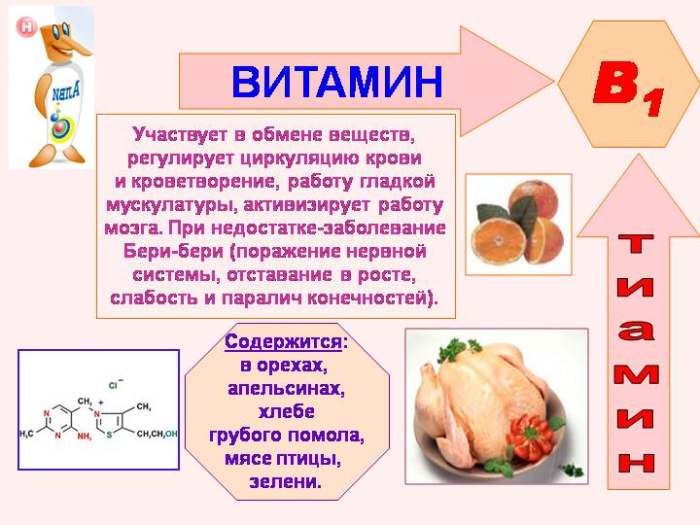
All iLive content is medically reviewed or fact checked to ensure as much factual accuracy as possible.
We have strict sourcing guidelines and only link to reputable media sites, academic research institutions and, whenever possible, medically peer reviewed studies. Note that the numbers in parentheses ([1], [2], etc.) are clickable links to these studies.
If you feel that any of our content is inaccurate, out-of-date, or otherwise questionable, please select it and press Ctrl + Enter.
Vitamin B1
Medical expert of the article
Last reviewed: 06.07.2025
This vitamin needs to be constantly replenished in the body, because vitamin B1 is water-soluble. It does not linger or accumulate in the body. Vitamin B1 is very good at fighting neuritis, so people with an exhausted nervous system should definitely include it in their diet.

Properties of Vitamin B1
Its second name is thiamine. This vitamin can be processed thermally, because it has the ability to withstand very high temperatures - up to 140 degrees. But this property is preserved only in an acidic environment, and in a neutral or alkaline environment, vitamin B1 begins to break down when heated.
Daily requirement of thiamine
It ranges from 1.6 to 2.5 mg for a man, from 1.3 to 2.2 mg for a woman, and from 0.5 to 1.7 mg for a child under 16 years of age.
When are higher doses of vitamin B1 needed?
- Under heavy loads - mental and physical
- During physical education and sports
- When the diet is oversaturated with carbohydrates
- When a person works in low temperature conditions (for example, in a country with a cold climate)
- Under stress
- When the body is oversaturated with toxins (including alcohol and tobacco)
- During pregnancy
The effect of vitamin B1 on the body
This vitamin activates metabolism, which means it helps control weight. Vitamin B1 is involved in carbohydrate metabolism, as well as amino acid metabolism. Thiamine (vitamin B1) helps products oxidize so that they can be actively broken down in the body. Thanks to vitamin B1, fatty acids are formed and also helps convert carbohydrates from flour and other high-calorie foods into fats.
 [ 5 ], [ 6 ], [ 7 ], [ 8 ], [ 9 ]
[ 5 ], [ 6 ], [ 7 ], [ 8 ], [ 9 ]
Symptoms of Vitamin B1 Deficiency
- Scattered attention and poor memory
- Depressive state
- Constant feeling of fatigue
- Hands are shaking
- Obsessive thoughts and feelings of inferiority
- Strong and groundless irritability
- Bad sleep
- Severe headaches
- Muscle weakness
- Poor appetite and its constant decrease
- Holding your breath and shortness of breath even with little exertion
- The heart beats quickly and unevenly
- Severe pain in the calves
- Burning sensation in the skin of the arms and legs
Thiamine stability
Vitamin B1 can be destroyed during cooking, i.e. temperature changes have a detrimental effect on it. Vitamin B1 is also destroyed during storage of products, and the more it is destroyed, the longer they are stored.
Causes of Thiamine Deficiency
If the body lacks vitamin B1, then you need to review your diet. Vitamin B1 may be lacking if a person consumes a lot of carbohydrates, often drinks alcoholic beverages, drinks a lot of coffee. When a person is under stress, the amount of thiamine is constantly decreasing.
Thiamine deficiency occurs when a person's diet contains a lot of protein.
What foods contain a lot of vitamin B1
- In pine nuts – 33.8 mg
- In pistachio nuts – 1 mg
- Peanuts contain 0.7 mg.
- In pork meat - 0.6 mg
- In lentils - 0.5 mg
- In oatmeal - 0.49 mg

